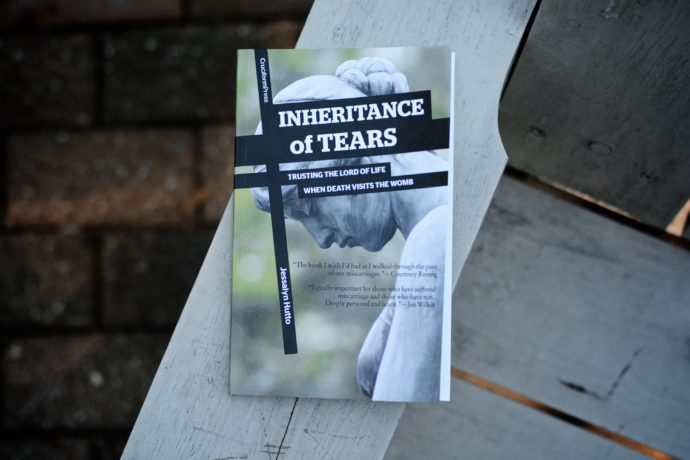Book Review: “An Inheritance of Tears,” by Jessalyn Hutto
 An Inheritance of Tears: Trusting the Lord of Life When Death Visits the Womb by Jessalyn Hutto, is a brief book of about 100 pages packed with Scriptural, gospel-centered perspective for women who have experienced baby loss. In five chapters, Hutto takes us through theology for death and suffering as a woman who is, sorrowfully, very familiar with baby loss due to miscarriage.
An Inheritance of Tears: Trusting the Lord of Life When Death Visits the Womb by Jessalyn Hutto, is a brief book of about 100 pages packed with Scriptural, gospel-centered perspective for women who have experienced baby loss. In five chapters, Hutto takes us through theology for death and suffering as a woman who is, sorrowfully, very familiar with baby loss due to miscarriage.
Our Limited Understanding
Hutto acknowledges that when we have experienced something so traumatic in our lives, our minds tend to want to fill the gap in understanding, meaning we seek to grasp the reasons and purposes God had in mind in not preventing our losses. We know that He is good and sovereign, and so, she encourages us to not try to fill that gap with our limited understanding: “God is always doing more than we could possibly imagine in ways we could never anticipate” (p. 18).
Scripture Speaking into Grief
Yet, she takes us through much from Scripture that we can know. She explains the birth of death in the garden of Eden and the infection of sin that has spread to us all. She gives Scriptural reasons why the deaths of our babies are not specifically linked to any particular sins we have committed. And she encourages us with Jesus’ troubled, even angered, reaction toward the effects of death on those who were grieving.
At the end of the first chapter, she shares a quote from Susannah Spurgeon about the sorrowful nature of this world and, yet, the hope to come, “Tears are the inheritance of earth’s children…tears may, and must come; but if they gather in eyes that are constantly looking up to [God] and heaven they will glisten with the brightness of the coming glory” (p. 33).
In chapter 2, she writes on the sovereignty of God, coming to a strengthening conclusion about prayer: “the reason it makes sense to pray for our unborn babies, even those we will eventually miscarry, is precisely because God is in control of their lives. For if he were not ultimately sovereign over all that happens in the womb, he would not be God at all. Prayer itself would be useless if God did not have the ability to act in response to it” (p. 36). In further reflection upon the sovereignty of God, she concludes, “Cursing God amid tragedy is natural…unless we know him. That’s the key.”
Next, in chapter 3, titled, “Our Good Shepherd,” she writes about God understanding feeling invisible, like baby loss due to miscarriage feels, because He is the Man of Sorrows who understands loneliness and isolation, the temptation to fear, and the intimate loss of relationship within the Godhead. She quotes Dan McCartney: “God knows what it is like to suffer, not just because he sees it in far greater clarity than we, but because he has personally suffered in the most severe way possible…the disruption of his own Family (the Trinity) by the immensity of his own wrath against sin” (p. 63).
Reasons to Believe Our Babies Are in Heaven
Moving on to chapter 5, Hutto writes on the glory to come, including her research about the heavenly destination of our babies. She quotes John MacArthur: “Scripture teaches that we are saved by grace, but damned by works.” So, while our babies inherited a sin nature from the original Adam, just like you and I, they never made the choice to sin.
She continues to cite Romans 1:18-20 as indicating that our babies do have, before God, the kind of excuse He will hear on judgment day—for they had no capability to suppress the truth of God evident in general revelation, His creation. She also gives 2 Samuel 12:22-23 as a sweet, Scriptural example of a baby going to heaven upon death. Toward the conclusion of this section, she quotes Charles Spurgeon, writing about baby loss: “We look to this as being the means by which Christ shall see of the travail of his soul to a great degree, and we do sometimes hope that thus the multitude of the saved shall be made to exceed the multitude of the lost.”
A Note of Reservation
Returning to themes of God’s sovereignty in chapter 4, Hutto seeks to define the word “good” used in Romans 8:28. She states: “Lastly, from this passage we learn specifically what God defines as our ‘good.’ Our ultimate good is that we increasingly take on the perfect moral character of Christ” (pg. 72).
Here, at this part of the review, I want to take us to the Biblical text and shift our focus. Romans 8:28-32 reads:
And we know that for those who love God all things work together for good, for those who are called according to His purpose. For those whom He foreknew He also predestined to be conformed to the image of His Son, in order that He might be the firstborn among many brothers. And those whom He predestined He also called, and those whom He called he also justified, and those whom He justified He also glorified. What then shall we say to these things? If God is for us, who can be against us? He who did not spare His own Son but gave Him up for us all, how will He not also with Him graciously give us all things?
God works all together. God has purposes. God foreknew. God predestined. We are conformed in order that Christ be exalted as firstborn among us. Again (the text says), God predestined. God called. He justified. He glorified. He is for us. He did not spare His own Son. God will, with Christ, graciously give us all things.
God has predestined believers to salvation for His glory. The trajectory of these verses tells me that because I have my salvation, I can trust that all of my circumstances work together for good—a good that when I experience it in eternity will make me say, God has graciously given me all things with Christ. The full context of this passage lifts my eyes to Christ, the Person.
Equating our increasing moral character with the good identified in Romans 8:28 could make a mother who has experienced loss think that she should point to a significant area of transformation in her character after loss, at least somewhat commensurate with the indescribable sorrow of loss, in order to see her child’s life have meaning. She might be tempted to conflate her child’s God-given worth with the impact her child makes upon her life or character. She could also feel tempted to use a change in moral character to justify the goodness of God. Finally, she might feel tempted to wonder if her loss could have been prevented should she have been holier already, which, in agreement with Hutto earlier in the book, God does not guide us toward in our thinking.
I praise God for the many gifts that can come into believers’ lives in and after loss, which give opportunity to know God’s presence, and to have opportunity to be a vessels of His honor, and I appreciate Hutto’s examples later in chapter 4. These gifts are about Him and set our minds there, with our Lord.
We know Him and have the promise of being conformed into the image of Christ because those “whom He predestined He also called, and those whom He called He also justified, and those whom He justified He also glorified.” This is a glorious list of the works of God. The way God promises in Romans 8:28 that all works together for our good depends upon His limitless capabilities and knowledge, and therefore the full definition of “good” must remain in mystery to our feeble minds. Yet, the salvation of Christ is the brilliant theme of our lives that makes us glory in God amidst our heartache, for no circumstance can separate us from the kind of love God has shown (Romans 8:39) or the kind of good purposes He alone can work (Romans 8:28; 32). No one else could give us the honor that we and our babies were predestined to have, to be glorified with Christ so that He can be honored as the firstborn, ahead of us. The outworking of Romans 8:28 is still mystery to us, but, because of the God who promises it, is inspiring of our highest trust, love, hope, peace, joy, contentment, anticipation of holy glory, and expectation for good.
Conclusion
Praise God for what He has done in our lives to give us and our babies a great salvation; praise God that He works all together for good for those who love Him and are called according to His purposes; praise God that He gives us Scripture so that we can have context for our experiences here. Notwithstanding the note of reservation about a couple of pages, An Inheritance of Tears is full of well-researched, beneficial, gospel-exalting, and Scriptural truth that Hutto will patiently and kindly walk you through, making it a valuable read. Many times while reading this book, my spirit shouted, yes! Also, she also shares personal experiences interwoven with her theology that I think Hope Moms who have experienced miscarriage will especially resonate with and find to be affirming in their grief.

Lianna (@liannadavis) and her husband, Tyler, have two dear girls—one who lives in heaven and one who lives on earth. Lianna serves with Hope Mommies. Find her and other Christian women writing at Of Larks.
Submit your writing to the Hope Mommies blog.
Widget not in any sidebars



Got something to say?